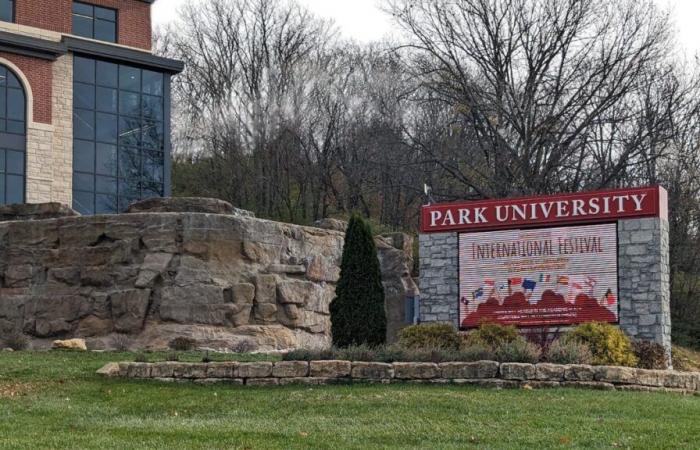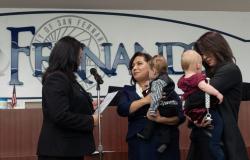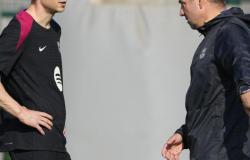Kansas City could shrink by about 80 acres if a request succeeds in shifting city boundaries to make some Park University property part of Parkville.
The proposal calls for Kansas City to let go of three parcels of undeveloped land the university owns, connected to the rest of its main campus. The area lies north and east of Missouri 9 about halfway between downtown Parkville and Park Hill South High School.
The university wants to simplify its operations by placing the whole property within the same town.
Parkville is on board with the plan, Mayor Dean Katerndahl said.
But Kansas City’s support is less certain.
The proposal has resurfaced objections made to a similar move proposed 25 years ago. In 1999, Park’s hopes of shifting regulation of the land to Parkville from Kansas City stalled, in part because the larger city worried it would lose oversight over blasting concerns if the university used the land for limestone mining and underground storage.
There are no specific plans to develop the area, university spokesperson Brad Biles said in an email.
“There has been no blasting and use of heavy equipment/trucks since mining was completed in 2020,” he wrote.
The City Planning Commission is slated to hear a recommendation from staff at its 9 a.m. meeting on Dec. 18, Kansas City public information officer Jordan Berger said, and the proposal could eventually advance to the City Council for a final decision.
A report from city staff on the project should be published online by Dec. 12 or 13, he said.
City Councilman Wes Rogers of Kansas City’s 2nd District, who represents the area, said he’s following staff members’ lead and is aware of potential problems.
He said discussion is still ongoing and hasn’t been contentious.
“Once the folks from Parkville and Park (University) look at the concerns, they may be able to accommodate them,” Rogers said. “Maybe we can figure something out that works for everybody.”
Why Park University wants de-annexation
The request to move 80 acres into Parkville “aims to simplify property management, enhance municipal service coordination and support strategic growth,” Biles wrote.
Having the property within one jurisdiction would mean the university wouldn’t have to navigate two different cities’ regulations and processes, university President Shane Smeed said in a letter to Kansas City.
It could also make municipal services for the area more efficient, he wrote, and allow “for more cohesive planning and partnership opportunities between the university and the City of Parkville.”
Parkville made a similar request in 1999.
Kansas City officials said in a staff report at the time that it wasn’t clear what inconveniences or problems Park University anticipated from the land remaining part of Kansas City.
The report also said the transfer could cost Kansas City tax money, set a damaging precedent and disrupt its plans for the broader area without bringing major benefits to the city in return.
It speculated that the university could mine the area for limestone and lease the resulting caves — as it did on other parts of its property.
“Kansas City engineers have experience with the monitoring of mine blasting and would like to keep that review,” the staff report said.
Current staff members unearthed the decades-old report and echoed some of the same concerns in an email chain last month that Rogers shared with The Beacon.
Issues cited include:
- Not being able to control blasting — which could disturb nearby residents or affect Riss Lake’s dam — if Park University were to expand the caves.
- The potential for the university to use Kansas City neighborhoods and roads for heavy equipment to enter the campus.
- Losing a say in future land use decisions.
- Unclear plans for the campus aside from a 2013 master plan.
- Questions about potential tax losses.
Biles said he did not have any specific examples of how the current situation is inefficient for the university.
De-annexation has happened sparingly in recent years, said Berger, the city public information officer, including when the city de-annexed part of a Belton golf course in 2021. Between 2005 and 2018, he said, the city received about 18 applications, but not all were successful.
The 1999 report cites three examples in the late 1980s and ‘90s when Kansas City refused de-annexation requests, as well as an instance where it transferred less than two acres to Gladstone.
Support in Parkville
Katerndahl, the Parkville mayor, said the city’s planning commission and Board of Aldermen have already approved the potential annexation, which needs buy-in from both cities.
“There didn’t seem to be any negatives,” he said. “Nothing’s going to happen up there right away, but down the road, it’ll make it easier to redevelop that property.”
Eventually, if the area gets developed, the city might have to worry about providing services like policing and utilities, Katerndahl said. But Parkville is happy to make a change in Park University’s favor.
“We think whatever helps the future or viability of the university is beneficial for the city,” he said.
Members of the public interested in the decision can attend or testify at the Dec. 18 meeting in person or online.
Notices sent to neighbors within 300 feet of the property about the hearing say the area in question lies between Northwest 52nd Terrace to the south, Northwest 56th Street to the north and the Parkville city limits to the west.
It’s to the northeast of the developed part of Park University’s main campus. The university owns more than 400 acres of undeveloped land in addition to the 165 acres that make up the active part of campus, Biles said.
In late 2023, Park University cut some of its satellite campuses, faculty and programs in response to declining enrollment.






